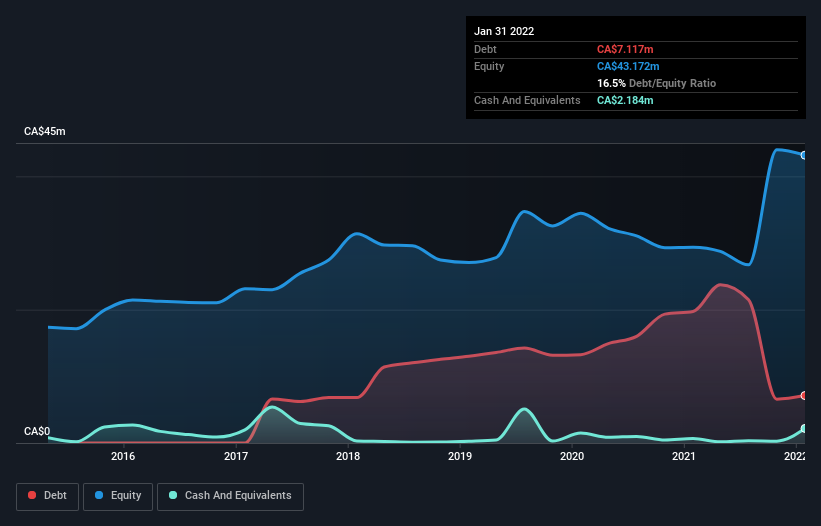Legendary fund manager Li Lu (who Charlie Munger backed) once said, 'The biggest investment risk is not the volatility of prices, but whether you will suffer a permanent loss of capital.' It's only natural to consider a company's balance sheet when you examine how risky it is, since debt is often involved when a business collapses. We can see that Gowest Gold Ltd. (CVE:GWA) does use debt in its business. But is this debt a concern to shareholders?
When Is Debt A Problem?
Debt assists a business until the business has trouble paying it off, either with new capital or with free cash flow. If things get really bad, the lenders can take control of the business. However, a more common (but still painful) scenario is that it has to raise new equity capital at a low price, thus permanently diluting shareholders. Of course, the upside of debt is that it often represents cheap capital, especially when it replaces dilution in a company with the ability to reinvest at high rates of return. The first step when considering a company's debt levels is to consider its cash and debt together.
Check out our latest analysis for Gowest Gold
What Is Gowest Gold's Debt?
As you can see below, Gowest Gold had CA$7.12m of debt at January 2022, down from CA$19.7m a year prior. However, it also had CA$2.18m in cash, and so its net debt is CA$4.93m.

A Look At Gowest Gold's Liabilities
Zooming in on the latest balance sheet data, we can see that Gowest Gold had liabilities of CA$18.8m due within 12 months and liabilities of CA$6.37m due beyond that. Offsetting this, it had CA$2.18m in cash and CA$100.7k in receivables that were due within 12 months. So it has liabilities totalling CA$22.9m more than its cash and near-term receivables, combined.
This deficit is considerable relative to its market capitalization of CA$26.3m, so it does suggest shareholders should keep an eye on Gowest Gold's use of debt. Should its lenders demand that it shore up the balance sheet, shareholders would likely face severe dilution. When analysing debt levels, the balance sheet is the obvious place to start. But you can't view debt in total isolation; since Gowest Gold will need earnings to service that debt. So if you're keen to discover more about its earnings, it might be worth checking out this graph of its long term earnings trend.
Given its lack of meaningful operating revenue, investors are probably hoping that Gowest Gold finds some valuable resources, before it runs out of money.
Caveat Emptor
Over the last twelve months Gowest Gold produced an earnings before interest and tax (EBIT) loss. To be specific the EBIT loss came in at CA$1.3m. When we look at that and recall the liabilities on its balance sheet, relative to cash, it seems unwise to us for the company to have any debt. Quite frankly we think the balance sheet is far from match-fit, although it could be improved with time. Another cause for caution is that is bled CA$3.1m in negative free cash flow over the last twelve months. So suffice it to say we consider the stock very risky. The balance sheet is clearly the area to focus on when you are analysing debt. However, not all investment risk resides within the balance sheet - far from it. Be aware that Gowest Gold is showing 6 warning signs in our investment analysis , and 4 of those are a bit concerning...
If you're interested in investing in businesses that can grow profits without the burden of debt, then check out this free list of growing businesses that have net cash on the balance sheet.
New: Manage All Your Stock Portfolios in One Place
We've created the ultimate portfolio companion for stock investors, and it's free.
• Connect an unlimited number of Portfolios and see your total in one currency
• Be alerted to new Warning Signs or Risks via email or mobile
• Track the Fair Value of your stocks
Have feedback on this article? Concerned about the content? Get in touch with us directly. Alternatively, email editorial-team (at) simplywallst.com.
This article by Simply Wall St is general in nature. We provide commentary based on historical data and analyst forecasts only using an unbiased methodology and our articles are not intended to be financial advice. It does not constitute a recommendation to buy or sell any stock, and does not take account of your objectives, or your financial situation. We aim to bring you long-term focused analysis driven by fundamental data. Note that our analysis may not factor in the latest price-sensitive company announcements or qualitative material. Simply Wall St has no position in any stocks mentioned.
About TSXV:GWA
Gowest Gold
Engages in the exploration and evaluation of gold mineral properties in Canada.
Moderate with mediocre balance sheet.
Market Insights
Community Narratives




